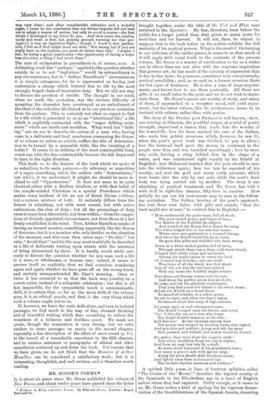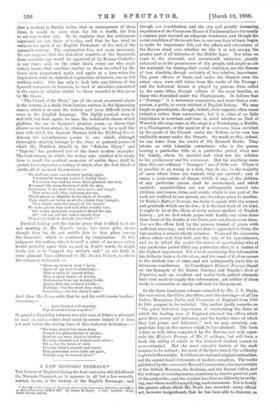MR. GOSSE'S POEMS"
IT is about six years since Mr. Gosse published his volume of New Poems, and about twelve years have passed since the lyrics • Finking in Exile, and other Paerns, By Edm2nd Gosie. Lqadon : Kegan Paul and Co. brought together under the title of On Viol and Flute were reviewed in the Spectator. He has, therefore, been before the public for a longer period than that given to many poets for seed-time and for harvest. It will not, then, be unjust to suppose that in the book before us the author exhibits the full maturity of his poetical powers. What is the result ? On turning to our criticism of the earlier poems, it seems to us that much of it will apply with equal truth to the contents of the present volume. Mr. Gosse is a master of versification so far as a writer
can be whose lines are not alive with the supreme inspiration that governs art ; he has much of the subtlety of expression that is due to fine taste ; he possesses, sometimes very conspicuously, poetical sensibility ; and, as we said on a former occasion, there are few signs of weakness. He is also a man of large acquire- ments, and knows how to use them poetically. All these are gifts of no small value to the poet, and we do not wish to depre- ciate them. Mr. Gosse's poems are worthy of study, and many
of them, if approached in a receptive mood, will yield enjoy- ment; but his latest volume, like its predecessors, seems to us instinct with culture, rather than with genius.
The story of the Persian poet Firdausi is well known,—how, one evening at Ghaznin, the youthful singer, at a trial of poetic strength, improvised a Stanza that made him the wonder of the townsfolk; how his fame reached the ears of the Sultan, who made him golden promises, which, however, he saw fit, when the poet's great work was finished, to pay in silver ; how the incensed bard gave the money in contempt to the people near him, and was banished accordingly ; how he went into exile, leaving a sting behind him in the shape of a satire, and was entertained right royally by the Khalif at Baghdad ; how Mahmond insistel that the poet should be sent into the wilderness again; how too late he repented of his cruelty, and sent the gold and many costly presents, which were borne into the city by one gate while the poet's dead body was being carried out by another. The story is one admitting of poetical treatment, and Mr. Gosse has told it with skill in eight-line stanzas, fifty-four in number. How artfully he can use his instrument may be seen in the follow- ing quotation. The Sultan, hearing of the poet's approach, has sent three men laden with gifts and camels, "that the bard might rise at ease," to conduct him to Baghdad :—
"Here underneath the palm-trees, full of shade, The poet tasted peace, and lingered long ;
The Master of the Faithful he obeyed, And searched the Koran for a theme for song.
The vizier lodged him in his own fair house, Where wine men gathered in a learned throng, And when the Khalif heard his pious vows, He gave him gifts and shielded him from wrong.
There in a white-walled garden full of trees, Through which there ran a deep, cold water-brook, Fringed with white tulips and anemones, Among the tender grass he wrote the book Of Yousouf and Zuleika; not one word Was there of all the windy war that shook Iran of old, nor was the ear once stirred With any name the Faithful might rebuke.
Nine thousand Persian verses told the tale, And when the perfect poem was set down, He rose, and left the plaintive nightingale, That long had tuned her throat to his sweet moan ; Before the Khalif on a broad divan To sound of rebecks, in a silken gown, He sat in state, and when the dance began Declaimed aloud that song of high renown.
Its music sank on well-attempered ears ; The Khalif lounged upon his throne, and cried, 'Lo! I this day am as a rnan who hears
The Angel Gabriel murmur at his side—
And dies not.' At the viewless hareem-door The screen was swayed by bending forms that sighed, And scheikhs and soldiers, young and old, for more Still pressed, and wished, and scarce would be denied.
Ah, palmy days were those for singer's craft ! Now every worldling flings his cap in rhyme, And from an easy bow lets fly a shaft At verse much honoured in his grandsire's time; Now many a ghezel, soft with spices, trips
Along the alien month with frivolous chime, And lightly rises from unhonoured lips
The ancient rhythm sonorous and sublime."
A spirited little poem, in lines of fourteen syllables, called "The Cruise of the Rover," describes the bigoted cruelty of the Spaniards in the Elizabethan age to a band of English sailors whom they had captured. Oddly enough, as it seems to us, Mr. Gosse makes a kind of apology for his vigorous denun- ciation of the bloodthirstiness of the Spanish Jesuits, observing that a resident in Dublin writes that in consequence of these lines, it would be more than his life is worth, for him to set foot in that city. So he explains that the sentiments expressed are not those of to-day, and that he has tried to write in the spirit of an English Protestant of the end of the sixteenth century. The explanation does not seem necessary. No one supposes that the diabolical cruelties of the Spaniards three centuries ago would be approved of by Roman Catholics in our time ; and, on the other hand, every one who reads history knows that cruelties similar to those described by Mr.
G-osse were perpetrated again and again at a time when the Inquisition, with its diabolical ingenuities of torture, was in full working order. One has only to look into any history of the Spanish conquests in America, to read of atrocities committed in the cause of religion similar to those recorded in this poem by Mr. Gosse.
"The Island of the Blest," one of the most prominent pieces in the volume, is a study from Lucian, written in the Spenserian stanza, which is at once the richest and most difficult form of verse in the English language. The highly poetical story is well told, but here, again, we miss the indefinable charm which gladdens the ear in Spenser's glorious poem,—a charm that allures us on from stanza to stanza, binding us by a spell like that with which the Ancient Mariner held the Wedding Guest. Among the miscellaneous poems is one which, although thoroughly original, belongs to the class of pastoral poems of which Mr. Matthew Arnold, in the "Scholar Gipsy" and " Thyrsis," has produced two of the finest modern examples. The final stanza, in which the writer asks whether it is wisely done to recall the poetical memories of earlier days, shall be quoted, for it expresses a feeling of which, after the first blush of youth, all of us must be conscious :—
"We shall not taste our showery spring again,
Yet cheerful memory makes it doubly dear ;
The leaves that had no scent when plucked, are sere,
But smell like roses freshened with the rain.
Perchance, if we went back once more, and sought That secret hill, that visionary stream, Which gleam so brightly in the glass of thought, They might not bring us all the charm they brought, They might undo the magic of the dream !
We have grown wise and cold with worldly lore, Our weary eyes have learned to dread the sun, Ah ! tell me, tell me, was it sagely done Thus to go back to Arcady once more ?"
Poetical feeling and the tender grace that is allied to it are not wanting in Mr. Gosse's verse ; but these gifts, choice though they be, do not entitle him to that place among the immortals which is conferred by imagination. In this judgment the author, who is himself a critic of no mean order, would probably agree with us, and, in Pope's words, he might justly ask us to "regard the writer's end," as set forth in some pleasant lines addressed to Mr. Austin Dobson, to whom the volume is dedicated :—
" From my homely store I bring Signs of my poor husbanding; — Here a spike of purple phlox, Here a spicy bunch of stocks, Mushrooms from my moister fields, Apples that my orchard yields,- Nothing,—for the show they make. Something,—for the donor's sake."
And then Mr. Gosse adds that he and his well-known brother- verseman,—
" . . have fronted evil weather, Nip of critic's frost together."
So genial a friendship between two able men of letters is pleasant to read of, and a critic's frost must be severe indeed if it does not melt before the closing lines of this fraternal dedication :—
"We have shared laborious days, Shared the pleasantness of praise ; Brother not more kind to brother, We have cheered and helped each other ; Till so far the fields of each
Into the other's stretch and reach, That perchance when both are gone, Neither may be named alone."







































 Previous page
Previous page